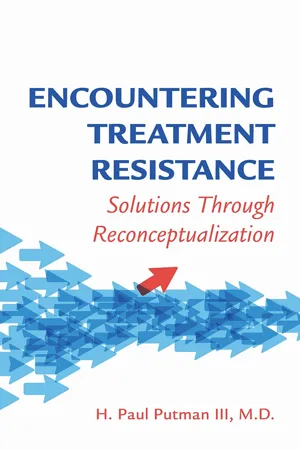
- 290 pages
- English
- ePUB (mobile friendly)
- Available on iOS & Android
About This Book
Recent studies suggest that anywhere from 20% to as much as 60% of psychiatric diagnoses are eventually labeled as treatment resistant. No consensus exists on a definition for treatment resistance, nor are there clear criteria for what is still an unrecognized diagnosis, which suggests that incomplete assessments, inadequate treatment planning, poor compliance, and faulty therapeutic alliances may be at play.
Given that second opinions identify additional treatment options in two-thirds of these cases, Encountering Treatment Resistance argues that it is time to move away from treatment resistance and toward pending remission. The author addresses opportunities for practitioners to avoid treatment resistance and failure through the following:
• Discussion of the processes underlying conceptualization and how inaccurate or misleading concepts may be developed• Description of best practices for problem-solving and the consequences for relying on less-effective methods• Outline of methods to ensure that clinicians consistently conduct a thorough evaluation at each patient contact• Highlights of common but underappreciated medical causes of treatment failure and examples of impaired therapeutic alliances interfering with diagnosis, treatment selection, and compliance
Numerous tables present information in an easily scanned format, and real-world case vignettes illustrate how the presented concepts, when applied to practice, lead to improved outcomes. Suggestions for additional reading and discussion topics facilitate collaboration, promote knowledge exchange, and broaden and deepen understanding. As accessible as it is thorough, the book includes summaries, key points, and self-assessment questions for each chapter that transform important concepts into applicable lessons and serve to reinforce knowledge.
Frequently asked questions
Information
Table of contents
- Cover Page
- Title Page
- Copyright Page
- Dedication
- Contents
- Acknowledgments
- Introduction
- 1 Conceptualization (and Failed Concepts)
- 2 Keys to Problem-Solving
- 3 The Goal of Evidence-Based Practice
- 4 The Myth of Treatment Resistance?
- 5 Essential Assessment and Reevaluation
- 6 Successful Outcomes
- 7 Underappreciated Causes of Treatment Failure
- 8 Reducing Treatment Failure: Steps to Follow
- 9 Managing a Sustained Therapeutic Relationship During Treatment Failure
- Index